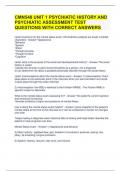CMN548 UNIT 1 PSYCHIATIC HISTORY AND
PSYCHIATIC ASSESSMENT TEST
QUESTIONS WITH CORRECT ANSWERS
carlat mnemonic for the mental status exam: All borderline subjects are tough, troubled
characters - Answer-*Appearance
*Behavior
*Speech
*Affect
*Thought process
*Thought content
*Cognitive
carlat: what is the purpose of the social and developmental history? - Answer-The social
history is useful:
1)allows the clinician to get to know the patient as a person, not a diagnosis
2) can determine info about a possible personality disorder through the social history
carlat: misconceptions about the mental status exam - Answer-1) misconception: that it
takes place at one particular point in the interview when you test orientation and recall-
it takes place through the entire interview
2) misconception- the MSE is identical to the Foltstein MMSE.- The Fostein MME is
specific screen for dementia.
What is the mental status exam assessing for? - Answer-*the patient's current cognitive
and emotional functioning
*denotes evidence of signs and symptoms of mental illness
how is doing the mental status exam helpful? - Answer-*gives snapshot of the patient's
mental status at the time of the interview so it can be compared to monitor for changes
over time
*Helps making a diagnosis when historical data is lacking and helps better describe the
patient to track progress over time.
Mental Status exam - Answer-1) Appearance and behavior
2) Motor activity - agitated slow, gait, freedom of movement, postures, pacing, tics,
jittery, lip smacking, tongue protrusion
3) Speech: fluency, amount, rate, tone, and volume.
,4) Mood- is subjective- patients internal and sustained emotional experience.
5) Affect: what mood appears to be as a clinician. Quality, quanitity, range,
appropriateness, and congruence.
6) Thought content: what the patient is thinking -
obsessions/compulsions/delusions/suicidality/homicidality/paranoia
7)Thought process- how thoughts are formulated/organized and expressed- described
as linear, organized and goal-directed. Flight of ideas, circumstantiality, tangential,
loose associations, poverty of thought.
8) Perceptual disturbances. Hallucinations/type/ content/depersonalization.
9) Cognition: alertness, orientation, concentration, memory/recent remote, immediate.
10) Abstract reasoning: ability to shift back and forth from general concepts and specific
examples. Like objects- fruit apple and pear, bus/airplane. Proverbs- cry over spilled
milk.
11) Insight why they are hear,do they think need help. Partial, full none.
12) Judgment- capacity to make good decisions. Participation in dangerous activities,
MSE/ evaluation of motor activity - Answer-agitated slow, gait, freedom of movement,
postures, pacing, tics, jittery, lip smacking, tongue protrusion
MSE evaluation of speech - Answer-fluency, amount, rate, tone, and volume.
MSE evaluation of mood - Answer-is subjective- patients internal and sustained
emotional experience.
MSE evaluation of affect - Answer-Affect: what mood appears to be as a clinician.
Quality, quanitity, range, appropriateness, and congruence.
carlat: qualities of affect- stability 0f affect
what can it detect - Answer-refers to a continuum from stable /normal to labile
*labile affect- mania, psychosis, dementia, other neuropsychiatric syndromes
carlat: appropriateness of affect - Answer-inappropriate behavior may not reflect
pathology
carlat: range of effect
What may it signify? - Answer-constricted affect- depressed
, flat affect-schizophrenia
carlat: intensity of affect- what mayit signify? - Answer-flat and blunted-severely
depressed or negative symptoms of schizophrenia
intense affect- manic or histrionic
MSE evaluation of thought content - Answer-what the patient is thinking -
obsessions/compulsions/delusions/suicidality/homicidality/paranoia
MSE evaluation of thought process - Answer-The flow of thought (coherent vs.
incoherent)
how thoughts are formulated/organized and expressed- described as linear, organized
and goal-directed.
Flight of ideas, circumstantiality, tangential, loose associations, poverty of thought.
MSE evaluation of perceptual disturbances - Answer-Hallucinations/type/
content/depersonalization.
MSE evaluation of cognition - Answer-alertness, orientation, concentration,
memory/recent remote, immediate.
MSE evaluation of abstract reasoning - Answer-ability to shift back and forth from
general concepts and specific examples. Like objects- fruit apple and pear,
bus/airplane. Proverbs- cry over spilled milk.
MSE evaluation of insight - Answer-why they are hear,do they think need help. Partial,
full none.
MSE evaluation of judgement - Answer-capacity to make good decisions. Participation
in dangerous activities,
what does the mental status exam also include - Answer-a cognitive screen, most often
the mini-mental status exam
It is especially important in neurologic and psychiatric evaluations. The purpose is to
evaluate, quantitatively and qualitatively, a range of mental functions and behaviors at a
specific point in time.
The MSE provides important information for diagnosis and for assessment of the
disorder's course and response to treatment.




